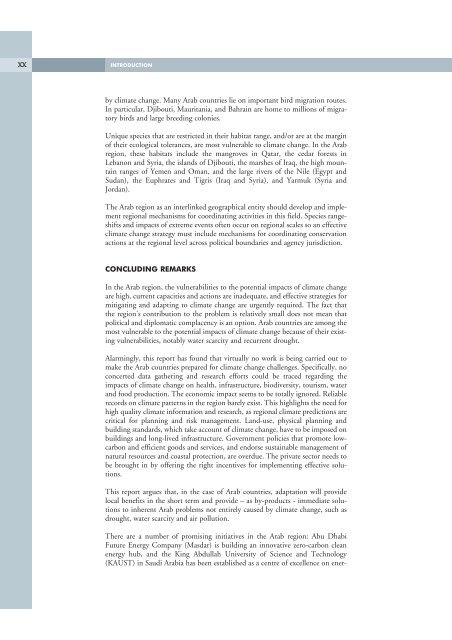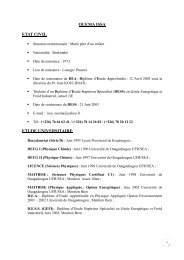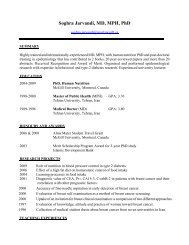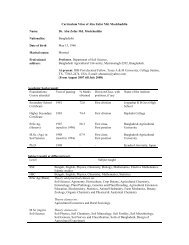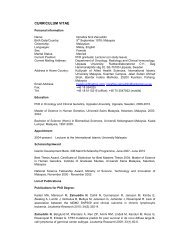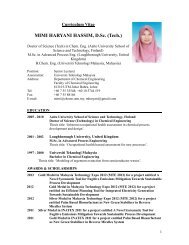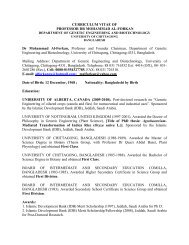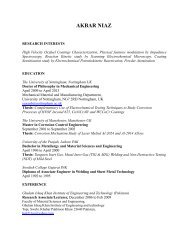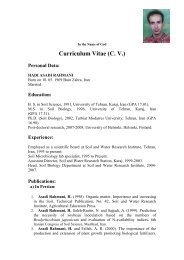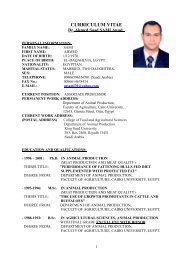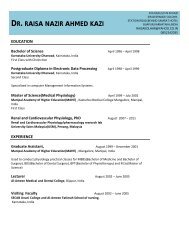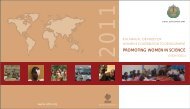Impact of Climate Change on Arab Countries - IPCC
Impact of Climate Change on Arab Countries - IPCC
Impact of Climate Change on Arab Countries - IPCC
You also want an ePaper? Increase the reach of your titles
YUMPU automatically turns print PDFs into web optimized ePapers that Google loves.
XX<br />
INTRODUCTION<br />
by climate change. Many <strong>Arab</strong> countries lie <strong>on</strong> important bird migrati<strong>on</strong> routes.<br />
In particular, Djibouti, Mauritania, and Bahrain are home to milli<strong>on</strong>s <str<strong>on</strong>g>of</str<strong>on</strong>g> migratory<br />
birds and large breeding col<strong>on</strong>ies.<br />
Unique species that are restricted in their habitat range, and/or are at the margin<br />
<str<strong>on</strong>g>of</str<strong>on</strong>g> their ecological tolerances, are most vulnerable to climate change. In the <strong>Arab</strong><br />
regi<strong>on</strong>, these habitats include the mangroves in Qatar, the cedar forests in<br />
Leban<strong>on</strong> and Syria, the islands <str<strong>on</strong>g>of</str<strong>on</strong>g> Djibouti, the marshes <str<strong>on</strong>g>of</str<strong>on</strong>g> Iraq, the high mountain<br />
ranges <str<strong>on</strong>g>of</str<strong>on</strong>g> Yemen and Oman, and the large rivers <str<strong>on</strong>g>of</str<strong>on</strong>g> the Nile (Egypt and<br />
Sudan), the Euphrates and Tigris (Iraq and Syria), and Yarmuk (Syria and<br />
Jordan).<br />
The <strong>Arab</strong> regi<strong>on</strong> as an interlinked geographical entity should develop and implement<br />
regi<strong>on</strong>al mechanisms for coordinating activities in this field. Species rangeshifts<br />
and impacts <str<strong>on</strong>g>of</str<strong>on</strong>g> extreme events <str<strong>on</strong>g>of</str<strong>on</strong>g>ten occur <strong>on</strong> regi<strong>on</strong>al scales so an effective<br />
climate change strategy must include mechanisms for coordinating c<strong>on</strong>servati<strong>on</strong><br />
acti<strong>on</strong>s at the regi<strong>on</strong>al level across political boundaries and agency jurisdicti<strong>on</strong>.<br />
CONCLUDING REMARKS<br />
In the <strong>Arab</strong> regi<strong>on</strong>, the vulnerabilities to the potential impacts <str<strong>on</strong>g>of</str<strong>on</strong>g> climate change<br />
are high, current capacities and acti<strong>on</strong>s are inadequate, and effective strategies for<br />
mitigating and adapting to climate change are urgently required. The fact that<br />
the regi<strong>on</strong>'s c<strong>on</strong>tributi<strong>on</strong> to the problem is relatively small does not mean that<br />
political and diplomatic complacency is an opti<strong>on</strong>. <strong>Arab</strong> countries are am<strong>on</strong>g the<br />
most vulnerable to the potential impacts <str<strong>on</strong>g>of</str<strong>on</strong>g> climate change because <str<strong>on</strong>g>of</str<strong>on</strong>g> their existing<br />
vulnerabilities, notably water scarcity and recurrent drought.<br />
Alarmingly, this report has found that virtually no work is being carried out to<br />
make the <strong>Arab</strong> countries prepared for climate change challenges. Specifically, no<br />
c<strong>on</strong>certed data gathering and research efforts could be traced regarding the<br />
impacts <str<strong>on</strong>g>of</str<strong>on</strong>g> climate change <strong>on</strong> health, infrastructure, biodiversity, tourism, water<br />
and food producti<strong>on</strong>. The ec<strong>on</strong>omic impact seems to be totally ignored. Reliable<br />
records <strong>on</strong> climate patterns in the regi<strong>on</strong> barely exist. This highlights the need for<br />
high quality climate informati<strong>on</strong> and research, as regi<strong>on</strong>al climate predicti<strong>on</strong>s are<br />
critical for planning and risk management. Land-use, physical planning and<br />
building standards, which take account <str<strong>on</strong>g>of</str<strong>on</strong>g> climate change, have to be imposed <strong>on</strong><br />
buildings and l<strong>on</strong>g-lived infrastructure. Government policies that promote lowcarb<strong>on</strong><br />
and efficient goods and services, and endorse sustainable management <str<strong>on</strong>g>of</str<strong>on</strong>g><br />
natural resources and coastal protecti<strong>on</strong>, are overdue. The private sector needs to<br />
be brought in by <str<strong>on</strong>g>of</str<strong>on</strong>g>fering the right incentives for implementing effective soluti<strong>on</strong>s.<br />
This report argues that, in the case <str<strong>on</strong>g>of</str<strong>on</strong>g> <strong>Arab</strong> countries, adaptati<strong>on</strong> will provide<br />
local benefits in the short term and provide – as by-products - immediate soluti<strong>on</strong>s<br />
to inherent <strong>Arab</strong> problems not entirely caused by climate change, such as<br />
drought, water scarcity and air polluti<strong>on</strong>.<br />
There are a number <str<strong>on</strong>g>of</str<strong>on</strong>g> promising initiatives in the <strong>Arab</strong> regi<strong>on</strong>: Abu Dhabi<br />
Future Energy Company (Masdar) is building an innovative zero-carb<strong>on</strong> clean<br />
energy hub, and the King Abdullah University <str<strong>on</strong>g>of</str<strong>on</strong>g> Science and Technology<br />
(KAUST) in Saudi <strong>Arab</strong>ia has been established as a centre <str<strong>on</strong>g>of</str<strong>on</strong>g> excellence <strong>on</strong> ener-


